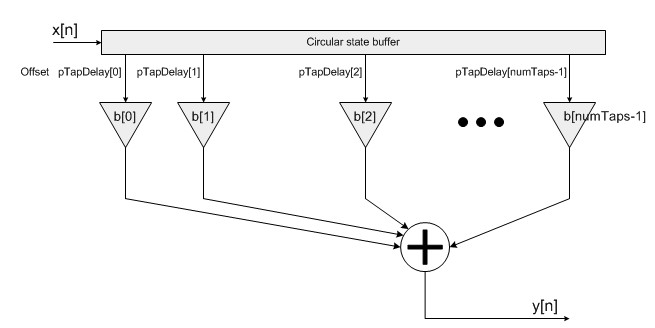 |
Project Ne10
An open, optimized software library for the ARM architecture.
|
 |
Project Ne10
An open, optimized software library for the ARM architecture.
|
Functions | |
| ne10_result_t | ne10_fir_sparse_init_float (ne10_fir_sparse_instance_f32_t *S, ne10_uint16_t numTaps, ne10_float32_t *pCoeffs, ne10_float32_t *pState, ne10_int32_t *pTapDelay, ne10_uint16_t maxDelay, ne10_uint32_t blockSize) |
| Initialization function for the floating-point sparse FIR filter. More... | |
| void | ne10_fir_sparse_float_c (ne10_fir_sparse_instance_f32_t *S, ne10_float32_t *pSrc, ne10_float32_t *pDst, ne10_float32_t *pScratchIn, ne10_uint32_t blockSize) |
| Specific implementation of ne10_fir_sparse_float using plain C. More... | |
| void | ne10_fir_sparse_float_neon (ne10_fir_sparse_instance_f32_t *S, ne10_float32_t *pSrc, ne10_float32_t *pDst, ne10_float32_t *pScratch, ne10_uint32_t blockSize) asm("ne10_fir_sparse_float_neon") |
| Specific implementation of ne10_fir_sparse_float using NEON SIMD capabilities. More... | |
Variables | |
| void(* | ne10_fir_sparse_float )(ne10_fir_sparse_instance_f32_t *S, ne10_float32_t *pSrc, ne10_float32_t *pDst, ne10_float32_t *pScratchIn, ne10_uint32_t blockSize) |
| Processing function for the floating-point sparse FIR filter. More... | |
There are separate functions for floating-point data types. The functions operate on blocks of input and output data and each call to the function processes blockSize samples through the filter. pSrc and pDst points to input and output arrays respectively containing blockSize values.
pTapDelay which specifies the locations of the non-zero coefficients. This is in addition to the coefficient array b. The implementation essentially skips the multiplications by zero and leads to an efficient realization.
y[n] = b[0] * x[n-pTapDelay[0]] + b[1] * x[n-pTapDelay[1]] + b[2] * x[n-pTapDelay[2]] + ...+ b[numTaps-1] * x[n-pTapDelay[numTaps-1]]

pCoeffs points to a coefficient array of size numTaps; pTapDelay points to an array of nonzero indices and is also of size numTaps; pState points to a state array of size maxDelay + blockSize, where maxDelay is the largest offset value that is ever used in the pTapDelay array. Some of the processing functions also require temporary working buffers.
*ne10_fir_sparse_instance_f32_t S = {numTaps, 0, pState, pCoeffs, maxDelay, pTapDelay};
| void ne10_fir_sparse_float_c | ( | ne10_fir_sparse_instance_f32_t * | S, |
| ne10_float32_t * | pSrc, | ||
| ne10_float32_t * | pDst, | ||
| ne10_float32_t * | pScratchIn, | ||
| ne10_uint32_t | blockSize | ||
| ) |
Specific implementation of ne10_fir_sparse_float using plain C.
Definition at line 1386 of file NE10_fir.c.
| void ne10_fir_sparse_float_neon | ( | ne10_fir_sparse_instance_f32_t * | S, |
| ne10_float32_t * | pSrc, | ||
| ne10_float32_t * | pDst, | ||
| ne10_float32_t * | pScratch, | ||
| ne10_uint32_t | blockSize | ||
| ) |
Specific implementation of ne10_fir_sparse_float using NEON SIMD capabilities.
| ne10_result_t ne10_fir_sparse_init_float | ( | ne10_fir_sparse_instance_f32_t * | S, |
| ne10_uint16_t | numTaps, | ||
| ne10_float32_t * | pCoeffs, | ||
| ne10_float32_t * | pState, | ||
| ne10_int32_t * | pTapDelay, | ||
| ne10_uint16_t | maxDelay, | ||
| ne10_uint32_t | blockSize | ||
| ) |
Initialization function for the floating-point sparse FIR filter.
| [in,out] | *S | points to an instance of the floating-point sparse FIR structure. |
| [in] | numTaps | number of nonzero coefficients in the filter. |
| [in] | *pCoeffs | points to the array of filter coefficients. |
| [in] | *pState | points to the state buffer. |
| [in] | *pTapDelay | points to the array of offset times. |
| [in] | maxDelay | maximum offset time supported. |
| [in] | blockSize | number of samples that will be processed per block. |
Description:
pCoeffs holds the filter coefficients and has length numTaps. pState holds the filter's state variables and must be of length maxDelay + blockSize, where maxDelay is the maximum number of delay line values. blockSize is the number of samples processed by the arm_fir_sparse_f32() function. Definition at line 260 of file NE10_fir_init.c.
| void(* ne10_fir_sparse_float) (ne10_fir_sparse_instance_f32_t *S, ne10_float32_t *pSrc, ne10_float32_t *pDst, ne10_float32_t *pScratchIn, ne10_uint32_t blockSize) |
Processing function for the floating-point sparse FIR filter.
| [in] | *S | points to an instance of the floating-point sparse FIR structure. |
| [in] | *pSrc | points to the block of input data. |
| [out] | *pDst | points to the block of output data |
| [in] | *pScratchIn | points to a temporary buffer of size blockSize. |
| [in] | blockSize | number of input samples to process per call. |
Points to ne10_fir_sparse_float_c or ne10_fir_sparse_float_neon.
Definition at line 186 of file NE10_init_dsp.c.
 1.8.11
1.8.11